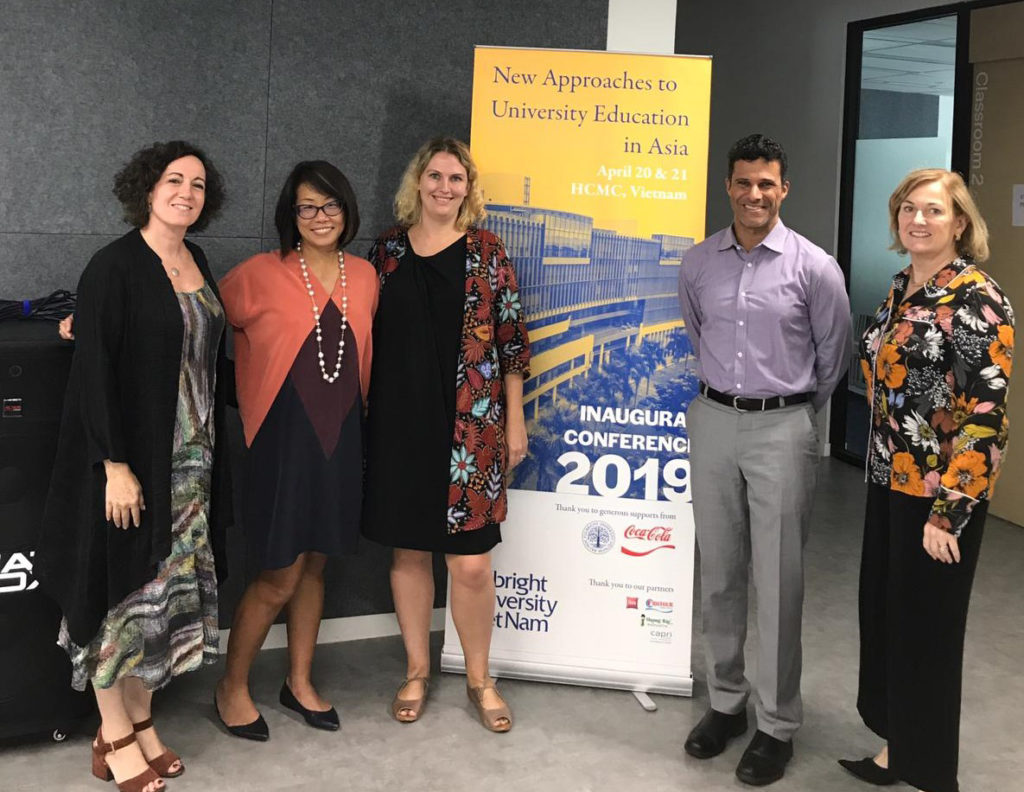Yale-NUS faculty share best practices at inaugural Fulbright Conference
On 20 and 21 April 2019, a group of Yale-NUS faculty travelled to Ho Chi Minh City, Vietnam to attend Fulbright University Vietnam’s inaugural conference. Titled ‘New Approaches to University Education in Asia’, our faculty aimed to share the best practices that they have developed since Yale-NUS first started.
Vice President (Engagement) Trisha Craig led the delegation not only to engage with other educators and administrators, but also to learn from other institutions’ experiences.
“The liberal arts and sciences as a form of education is gaining traction across Asia and as new institutions are founded, it is a wonderful opportunity to collaborate, share experiences and learn from each other,” she said.
Dr Craig gave a keynote address at the conference titled ‘The Rise of Liberal Arts in Asia’, where she discussed the challenges and opportunities of this new model of education in the region.
Three Yale-NUS faculty also spoke at the conference’s opening panel titled ‘Liberal Arts in Asia: An Interdisciplinary Approach for a Sustainable Future’.
Associate Professor of Humanities (Literature) Mira Seo kicked off the discussion by sharing about the conceptualisation and evolution of the Yale-NUS Common Curriculum. The Common Curriculum is an interdisciplinary set of courses, which span the humanities, social sciences and science, that all Yale-NUS students take in their first two years at College. She highlighted how the Common Curriculum is comparative, trans-cultural and challenges the binary paradigm of “east means west”.
 Image provided by Julianne Thomson.
Image provided by Julianne Thomson.
Professor of Science (Environmental Studies and Geophysics) Brian McAdoo then spoke about experiential learning initiatives, such as Envirolab Asia, a partnership between Yale-NUS and California’s Claremont Colleges. EnviroLab Asia is an environmental laboratory for cross-disciplinary research and experiential learning that links knowledge with practice which allows our students and faculty become active practitioners of change who develop sustainable and socially just policy-relevant solutions to environmental challenges in Asia.
In contrast to these larger innovations, Assistant Professor of Humanities (Literature) Nienke Boer shared about what she described as a “micro-innovation” in terms of the type of classes that are taught and the ways that students are assessed.
“I started my presentation with the following provocation: Developing a liberal arts tradition in Asia involves disrupting established canons and disciplinary boundaries. As liberal arts colleges in Southeast Asia, what kinds of elective courses should we teach and how should we assess our students in these courses?”
Using a class that she had developed and taught at Yale-NUS titled Oceanic Frameworks: Shifting Currents in Literature Studies, she sought to answer both questions.
On the type of classes, Asst Prof Boer pointed to Southeast Asia’s long history of interlinked maritime networks, and the region’s vulnerability to rising sea levels and other aspects of climate change, which led her to teach a class on oceans. She suggested that scholars similarly look at areas that would be relevant to students in this part of the world
On assessment methods, she shared about the experimental assignment that she had employed in the class, one that was more interactive and more closely mimicked the experience of actually submitting an article to an academic journal.
“Students used our assigned readings to identify gaps in knowledge, picked a keyword which would address that gap, submitted it and received blind peer review from their classmates as well as comments from me, and then revised and resubmitted the keyword entry,” she said.
Asst Prof Boer had received a Teaching Innovation Grant from the Yale-NUS Centre for Teaching & Learning to support the development and implementation of this form of assignment. The final entries were published and made publicly available through a blog and printed booklet.
Asst Prof Boer then invited the conference audience to rethink the typical final assignments in their discipline in terms of how they could be adapted to offer a more authentic and interactive experience for both students and instructors.
In addition to sharing her own experiences, Asst Prof Boer found it “incredibly interesting to learn about all of the other liberal arts colleges in Asia and think about the different models they have adopted”.
“It was insightful to think about how the same idea (the liberal arts) can take these different forms depending on local contexts,” she added.
Dean of Faculty and Professor of Social Sciences (Public Health and Psychology) Jeannette Ickovics, who also attended the conference, noted that participation at these events help faculty members to “see and hear what others are doing, share best practices and develop collaborative opportunities for research and teaching”.
She was especially encouraged and excited by the investment, energy and motivation by these institutions to adapt to the changing needs of students in Asia.
“Asia is at the edge of great innovation in education and the conference made clear that there is a need to think both inside and outside the classroom to move beyond knowledge transfer to critical thinking and deep engagement,” she said.
Reflecting on her takeaways from the conference, Dr Craig said, “While the specific models vary, all of us face similar challenges and the kind of conversations the conference at Fulbright facilitated offered valuable insights.”
“It’s very gratifying to see that Yale-NUS, even as a relatively new institution, is held up as a particularly successful example and we are happy to serve as a resource for the newer kids on the block.”





